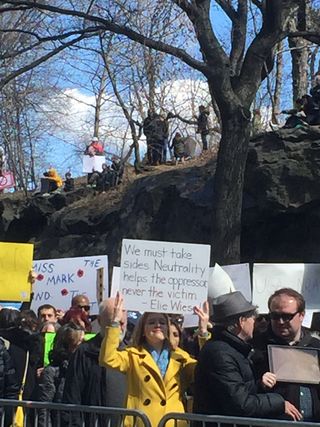Education
Holocaust Education as a Pathway to Peace
The lessons of history still resonate today.
Posted March 31, 2018

Last Saturday, I participated in the March For Our Lives rally in New York. As I was walking through the streets, I was awed by the sheer number of people and the signs that were accompanying them. And then I was struck by a particular sign being raised by a young woman. It was a quote from recently deceased Holocaust survivor Eli Wiesel that read: “We must take sides. Neutrality helps the oppressor, never the victim.” His name was on the bottom of the sign after the quote.
That sign resonated with me in particular because I have been the Scholar-in-Residence at the Kupferberg Holocaust Center at Queensborough Community College for almost a year now as part of a larger grant funded by the National Endowment of the Humanities. This academic year, I have been putting together a program for our students and larger community exploring the theme of complicity and collaboration during the Holocaust. As the recipient of this grant, I have been tasked with selecting a theme to help students better understand the Holocaust, and one that in particular still resonates today. I chose complicity and collaboration because I am interested in the role that bystanders played during this genocide. Moreover, the way that we make decisions as witnesses to social injustice still resonates across the globe today.
Apparently, complicity has been on the mind of a lot of people lately. Dictionary.com selected “complicity” as word of the year for 2017, defining it as, “choosing to be involved in an illegal or questionable act, especially with others; having complicity” (Chappell, 2017, para 1). In the wake of the MeToo movement, the questionable behaviors of many in our current administration, and the growing concern regarding the role that technology platforms (and their makers) have been playing in collecting and harvesting user data, the website selected complicity as the word of the year “citing its new relevance in politics and social commentary” (Chappell, 2017, para 1).
I was drawn to the concepts of both complicity and collaboration in my study of the Holocaust as a means of trying to comprehend how genocide could be carried out on such a massive scale. In this context, I conceptualize complicity as silence or inaction in the face of growing escalation of persecution against the Jewish people, a kind of approval by silence (or guilt by association) of Nazi actions by regular civilians. Collaboration is a step further, an active participation in or assistance of Nazi crimes by regular people that enabled the scale and scope of the genocide to occur. Identifying the role that bystanders play when injustices are occurring is critical in unraveling all of the facets of a given social situation that enable violence towards a victim group to occur. In contrast, scholars have identified from the perspective of prevention that bystander action or helping behaviors can be crucial to mitigating or stopping genocidal violence from escalating.
History does not just happen to people. Individuals are engaged in the world they live in—whether we like it or not, we are the makers of history. Decision making—whether inaction, passivity, or somewhere in between that and deliberate action—are critical privileges every individual has to make in any given situation. Too often, in the face of mounting injustice or violence, we become passive—out of fear, apathy, because we have something to gain when the victim group is targeted, out of self-interest—for whatever the reasons, that form of complicity must be eradicated to maintain a democracy.
The website that selected complicity as the word for last year elaborates with this description:
Choosing a word of the year is always an attempt to capture the zeitgeist. In the case of complicity in 2017, the site says, ‘It’s a word that reminds us that even inaction is a type of action. The silent acceptance of wrongdoing is how we’ve gotten to this point.’ (As quoted by Chappell, 2017, para 9)
The March For Our Lives movement represents democracy in action. It represents the attempt to curtail silence in the face of tragedy and become active participants in changing the society for better. I was reminded of that last Saturday when I saw that poster quoting Wiesel. I am reminded of it every day when I prepare to go into my classrooms and expose students to the Holocaust in a way that doesn’t just give them a historical understanding of this genocide but enables them to see its lessons in the context of the present day. Now, more than ever, the tagline of the United States Holocaust Memorial Museum in DC comes to mind—what you do matters. That, to me, is the opposite of complicity.
Copyright Azadeh Aalai 2018
References
Chappell, B. (2017, November 27). ‘Complicit’ is the word of the year in 2017, Dictionary.com says. NPR: America. Retrieved on March 31, 2018 from: https://www.npr.org/sections/thetwo-way/2017/11/27/566763885/complicit-…


